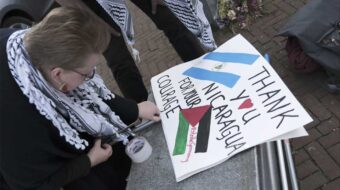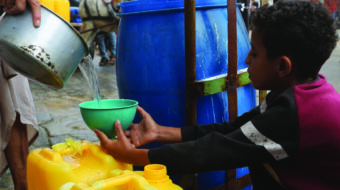With CIA backing, General José Efraín Ríos Montt seized power in Guatemala in March 1982. With two co-conspirators soon abandoning the coup, Rios Montt ruled alone until August 1983. He now faces trial on charges of genocide and crimes against humanity. The army he commanded accounted for 200,000 murders during a 36-year civil war. Soldiers terrorized and murdered at record levels during his tenure.
Judge Carol Patricia Flores indicted Rios Montt Jan. 26, placing him on house arrest. Another judge quickly denied his petition for amnesty stemming from immunity he enjoyed as a parliamentarian. Rios Montt’s trial begins in mid April.
Ending the investigatory phase of the proceedings, Human Rights Prosecutor Manuel Vásquez on March 27 presented evidence to the Supreme Court showing that, on Rios Montt’s watch, three adjacent municipalities in Quiche department experienced 11 massacres, 1,771 people murdered, 1,485 women raped, and 29,000 people displaced. Soldiers surrounded towns and denied residents food, health care, and water. Victims were of Mayan Ixil ethnicity.
That four other former military leaders also face prosecution suggests civil war-era impunity may be weakening somewhat. Claims of serious illness have delayed proceedings for two of them. Three army officers were jailed in 2009 for carrying out “disappearances” in El Jute in 1981. Low ranking soldiers were sentenced earlier for the 1982 Rio Negro massacre. On March 12, former School of the Americas instructor Pedro Pimentel, extradited from the United States, joined four previously tried counterparts in receiving a 50-year jail sentence for murdering 201 indigenous inhabitants of Dos Erres in 1982. All were members of the abusive Kaibiles counter insurgency force.
The national Congress on Jan. 26 approved Guatemalan affiliation with the Statute of Rome that in 1998 launched the International Criminal Court, which adjudicates crimes against humanity.
Rios Montt’s fate is uncertain. His lawyers say jurisdiction in his case lies with military courts exclusively. They are appealing his loss of amnesty as a former parliamentarian. Regular criminal charges do not apply to Rios Montt’s role during the civil war. That’s because on Dec. 27, 1996, as peace was being concluded, Guatemala’s Congress enacted its “Law of National Reconciliation,” which relieves insurgents and soldiers alike of criminal responsibility for crimes committed during the war. It does allow prosecution for genocide, torture, and civilian “disappearances.” Violence attending a politically motivated war thus morphed into the category of “political crimes,” subject to amnesty.
Rios Montt’s defenders say civil war was fought to liberate Guatemala from threatened communist take-over. Indeed, the political nature of that war – non-genocidal in character, they say – was evident in President Ronald Reagan’s kind words in Guatemala City for host Rios Montt in 1982: “a man of great personal integrity and commitment. … I know he wants to improve the quality of life for all Guatemalans and to promote social justice.”
Proving genocide is not easy. The Statute of Rome requires that intention be established and that genocide be defined as prioritized extermination of a national, religious, or ethnic group. By this reckoning, Armenians killed by Turks in 1919, Jews dying during the Holocaust, and Rwandan Tutsis murdered by Hutus in 1994 were victims of genocide. But half a million or more leftists killed in Indonesia in 1965 were not. There and in Guatemala, political objectives were foremost – or so goes the argument recounted by analyst Carlos Figueroa Ibarra. Besides, prioritization remains obscure in Guatemala, especially with 83 percent of civil war soldiers and police sharing Mayan ethnicity with victims.
Guatemala’s efforts to shed impunity are pulled one way by the shared interests of those in charge, including military veterans, and another way by international observers. Polarity is reflected in remarks by new President Otto Pérez Molina, who recently declared: “[H]ere in Guatemala there was no genocide. What typifies genocide is when there is extermination of a race by reason of its being a race.” But late last year, while campaigning for the presidency, he assured Reuters that, “I’m going to be respectful of the law… Justice has to take its course.”
In 1982 Army officer Pérez served as intelligence head in Nebaj, Quiché – one of the three municipalities designated as massacre sites in accusations against Rios Montt. According to the National Security Archives, Pérez “participate[d] in former military dictator Efraín Ríos Montt’s counterinsurgency and ‘scorched earth’ campaigns in the Quiché region.” A patrol led by Pérez caused the “death of four civilians and the capture of 18 adults and 12 children.” Pérez Molina graduated from the U.S. Army School of the Americas, served as intelligence head both of the brutal Kaibiles unit and of the Army itself. He represented the Army in peace negotiations.
Reporting on testimony against Rios Montt in Spanish court proceedings, Reuters cites one witness claiming that Pérez, “ordered the burning of towns,” another that soldiers under Pérez ‘s command tortured him, and a third that Pérez burned a community and killed residents.
Yet international human rights advocates are paying attention: notably, recently interviewed European Parliament members. And to end impunity in Guatemala, Norway in recent years has contributed $2,619, 052; Netherlands, Belgium, and Luxembourg, $8,292,480. “Guatemala has the opportunity to be an example to the world,” writes David Tolbert, President of New York-based International Center for Transitional Justice. He adds, however, “The crime of genocide is rarely tried in a national court.”












Comments